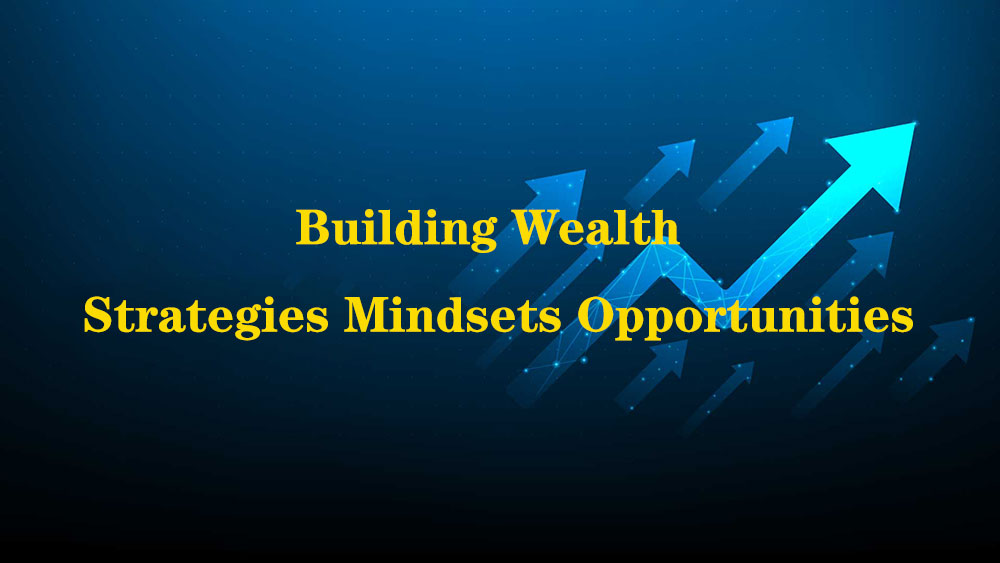Building wealth in today’s dynamic economy requires a blend of discipline, strategic thinking, and a willingness to explore diverse opportunities. Whether you’re starting from scratch or looking to grow existing assets, the journey to financial independence is both a science and an art. This guide dives into practical strategies for wealth-building, including the often-misunderstood world of forex trading, while offering a fresh perspective grounded in real-world experience and long-term vision.

The Foundation: Mindset and Financial Discipline
Wealth-building starts with how you think about money. I’ve seen too many people chase quick riches only to end up burned out or broke. The truth is, wealth isn’t just about numbers in a bank account—it’s about creating systems that let your money work for you over time.
Key Principles:
- Live Below Your Means: This isn’t about deprivation but about prioritizing value. Spend intentionally on what aligns with your goals and cut out waste. For example, instead of upgrading your car every few years, redirect that money into investments.
- Set Clear Goals: Define what wealth means to you. Is it early retirement? A dream home? Funding a passion project? Clarity drives action.
- Automate Savings: Treat savings like a bill. Automate transfers to investment accounts to remove temptation and ensure consistency.
A great resource for cultivating a wealth-building mindset is The Millionaire Next Door by Thomas J. Stanley and William D. Danko. It’s a timeless reminder that most millionaires aren’t flashy—they’re disciplined.
Diversifying Income Streams
Relying solely on a single income source, like a 9-to-5 job, is like putting all your eggs in one basket. Diversification isn’t just for investments—it’s for income, too. Here are some practical ways to create multiple streams:
- Side Hustles: Freelancing, consulting, or starting an online business can supplement your income. Platforms like Upwork or Etsy make it easier than ever to monetize skills or hobbies.
- Real Estate: Rental properties or real estate investment trusts (REITs) offer passive income. For beginners, check out Fundrise for accessible real estate investing.
- Dividend Stocks: Investing in companies that pay consistent dividends provides a steady cash flow. Use platforms like Robinhood or Fidelity to start small.
My take? Don’t spread yourself too thin. Pick one or two income streams that align with your skills and scale them over time. I started with a small freelance gig writing for niche blogs, and it taught me the value of reinvesting profits into bigger opportunities.
The Power of Investing
Investing is the engine of wealth-building. The earlier you start, the more time compound interest has to work its magic. Here’s a breakdown of key investment vehicles:
1. Stock Market
The stock market remains a cornerstone of wealth-building. Index funds, like those tracking the S&P 500, offer low-risk, long-term growth. Platforms like Vanguard or Charles Schwab make it easy to invest in low-cost ETFs.
Pro Tip: Don’t try to time the market. Dollar-cost averaging—investing a fixed amount regularly—reduces risk and takes emotion out of the equation.
2. Real Estate
Beyond rentals, consider house hacking (living in one unit of a multi-family property while renting out the others). It’s a strategy I’ve seen friends use to build wealth in their 20s with minimal upfront capital. Explore BiggerPockets for real estate education.
3. Cryptocurrency
Crypto is a high-risk, high-reward space. While I’m skeptical of the hype around speculative coins, Bitcoin and Ethereum have shown resilience as long-term stores of value. Use trusted exchanges like Coinbase and never invest more than you can afford to lose.
4. Forex Trading
Forex, or foreign exchange trading, involves buying and selling currencies to profit from exchange rate fluctuations. It’s a unique market due to its 24/7 nature and high liquidity, but it’s not for the faint-hearted. Here’s why:
- Leverage Risks: Forex brokers often offer high leverage (e.g., 100:1), meaning you can control large positions with small capital. But this amplifies both gains and losses. I learned this the hard way when a sudden market swing wiped out a poorly managed trade.
- Education is Key: Before diving in, study market trends, technical analysis, and risk management. Resources like Babypips offer free, beginner-friendly courses.
- Start Small: Use a demo account on platforms like MetaTrader 4 or eToro to practice without risking real money.
Forex appeals to those who thrive on strategy and data, but it’s not a get-rich-quick scheme. Treat it as a skill to develop, not a slot machine.

Managing Risk
Wealth-building isn’t about avoiding risk—it’s about managing it. Here’s how:
- Emergency Fund: Keep 3-6 months of expenses in a high-yield savings account. Ally Bank offers competitive rates.
- Diversification: Spread investments across asset classes (stocks, bonds, real estate, etc.) to reduce exposure to any single market.
- Continuous Learning: Markets evolve, and so should your knowledge. Podcasts like The Money Guy Show or books like A Random Walk Down Wall Street keep you sharp.
The Role of Forex in a Wealth Portfolio
Forex trading deserves a special mention because it’s often misunderstood. Unlike stocks or real estate, forex is a zero-sum game—someone’s gain is another’s loss. Yet, it offers unique advantages:
- Accessibility: You can start with as little as $100 on platforms like OANDA.
- Flexibility: Trade on your schedule, thanks to the global market’s round-the-clock operation.
- Hedging Opportunities: Forex can protect against currency fluctuations if you’re investing internationally.
However, forex isn’t for everyone. It requires patience, emotional discipline, and a tolerance for volatility. I’ve met traders who treat it like a full-time job and others who use it as a small part of a diversified portfolio. Find what fits your risk appetite.
My Perspective: Wealth as Freedom
Here’s where I get personal. To me, wealth isn’t about flaunting luxury—it’s about freedom. Freedom to leave a job you hate, to travel without stress, or to give back to your community. Every financial decision I make is filtered through this lens: Does this move me closer to freedom? That’s why I prioritize investments over flashy purchases and learning over chasing trends.
One story sticks with me: a mentor who retired at 40 because he invested 20% of his income in index funds starting in his 20s. He wasn’t a genius—he was consistent. That’s the real secret to wealth.
Actionable Steps to Start Today
- Assess Your Finances: Track your income, expenses, and net worth using tools like Mint or YNAB.
- Build a Budget: Follow the 50/30/20 rule—50% needs, 30% wants, 20% savings/investments.
- Learn Forex Basics: Spend a month on a demo account before risking real money.
- Invest Consistently: Start with $50/month in an index fund if that’s all you can afford. It adds up.
- Review Annually: Adjust your strategy as your income and goals evolve.
Building wealth is a marathon, not a sprint. It’s about making informed choices, staying disciplined, and embracing opportunities like forex trading with caution and curiosity. By diversifying income, investing wisely, and managing risks, you can create a financial future that aligns with your dreams. Start small, stay consistent, and let time do the heavy lifting.

